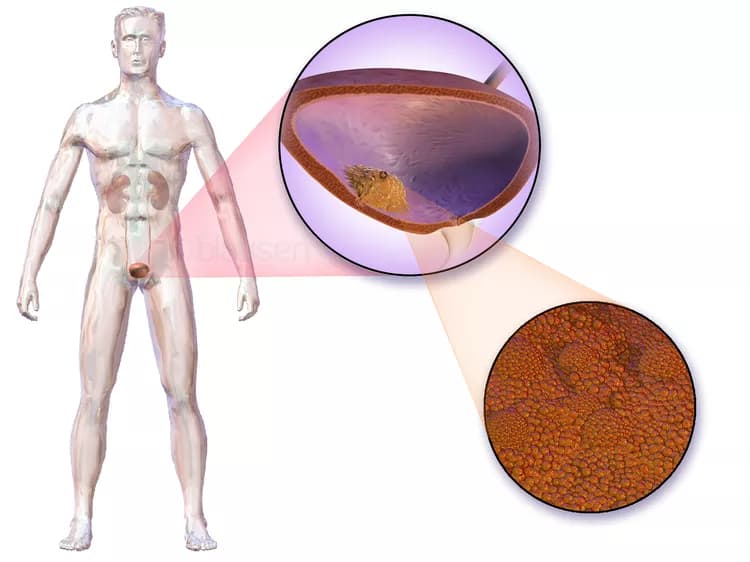
Combined Modality Treatment Could Be First Course For Muscle-Invasive Bladder Cancer
A meta-analysis of previously published cancer research showed no difference in five-year and 10-year survival rates between patients who underwent radical cystectomy, which is the surgical removal of the bladder, and a bladder-preserving combined modality treatment (CMT) plan, which combines radiation therapy, chemotherapy and the removal of the bladder tumor. The study is published in the International Journal of Radiation Oncology * Biology * Physics, the flagship journal of the American Society for Radiation Oncology.
With muscle-invasive bladder cancer (MIBC), when the cancer has invaded the muscle layer of the bladder wall, radical cystectomy (RC) is currently the standard course of treatment, with CMT reserved as a secondary option for patients not healthy enough for RC. There are drawbacks to undergoing a radical cystectomy, however -- namely that additional surgery is needed after removal of the bladder to reconstruct a way to store urine, either inside or outside of the body.
Combined modality treatment -- consisting of radiation therapy, concurrent chemotherapy and maximal transurethral resection of the bladder tumor -- provides an alternative to complete bladder removal for patients with MIBC. This approach could potentially be considered as a first course of treatment for many patients, say the study's authors -- not just for those patients with significant comorbidities.
"These results provide compelling evidence suggesting radiation therapy may be as good as surgery for many of these patients," said Dharam Kaushik, MD, senior author of the study and an assistant professor at The University of Texas Health Science Center, now called UT Health San Antonio, and the UT Health Cancer Center. "We hope this study will help patients and their physicians understand the full range of options available when planning treatment for muscle-invasive bladder cancer."
Researchers comprehensively reviewed 19 published studies encompassing 12,380 patients, of which eight prospective and retrospective studies encompassing 9,554 patients were eligible for the meta-analysis. Eligible studies directly compared one or more survival outcome between the two treatment approaches (i.e., radical cystectomy or combined therapy including radiation). Researchers computed hazard ratios (HR) to compare survival outcomes including overall survival (OS), disease-specific survival (DSS) and progression-free survival (PFS) at five and 10 years' post-treatment.
The researchers found no difference in OS at five years' post-treatment (HR, 0.96, favoring CMT; p = 0.778; four studies, 452 patients) or 10 years (HR, 1.02, favoring RC; p = 0.905; five studies, 9,295 patients). They also found no difference in DSS at five years (HR, 0.83, favoring CMT; p = 0.390; two studies, 326 patients) or 10 years (HR, 1.17, favoring RC; p = 0.264; four studies, 9,171 patients). At 10 years, post-treatment, they found no difference in PFS (HR, 0.85, favoring CMT; p = 0.639; two studies, 293 patients). There were no studies that examined PFS at five years' post-treatment.
"According to our analyses, patients undergoing radical cystectomy likely share no cancer survival benefits compared with patients receiving chemoradiation-based bladder preservation therapy," said Dr. Kaushik.
These findings -- that a less-invasive treatment option may be sufficient -- are encouraging for those with MIBC. And while the researchers say that bladder-preserving treatment, such as CMT, may be an option for more patients, they say it also highlights the need for more studies specifically comparing the two modalities.
"Further research is needed to evaluate these two treatment arms -- radical cystectomy versus combined modality treatment -- to identify optimal treatments for specific patients," said Dr. Kaushik.
Based on the results published in the journal article, Dr. Kaushik and his team have launched a pilot clinical research study of 30 patients with MIBC. Half will be treated with RC and half will be treated with CMT, including radiation therapy. The trial is currently enrolling patients.
Materials provided by American Society for Radiation Oncology. Note: Content may be edited for style and length.
Disclaimer: DoveMed is not responsible for the accuracy of the adapted version of news releases posted to DoveMed by contributing universities and institutions.
Primary Resource:
Vashistha, V., Wang, H., Mazzone, A., Liss, M. A., Svatek, R. S., Schleicher, M., & Kaushik, D. (2016). Radical Cystectomy Compared to Combined Modality Treatment for Muscle-Invasive Bladder Cancer: A Systematic Review and Meta-Analysis of over 12,000 patients. International Journal of Radiation Oncology* Biology* Physics. DOI: 10.1016/j.ijrobp.2016.11.056
Related Articles
Test Your Knowledge
Asked by users
Related Centers
Related Specialties
Related Physicians
Related Procedures
Related Resources
Join DoveHubs
and connect with fellow professionals

0 Comments
Please log in to post a comment.